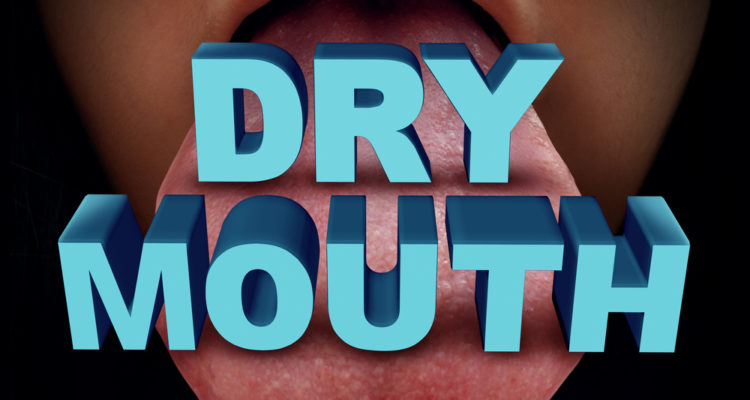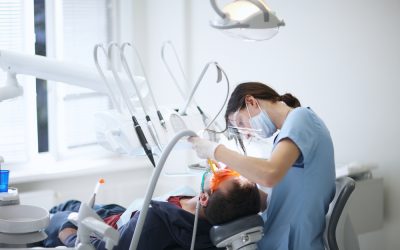We’ve all had a little taste of dry mouth at some point in our lives – ever woken up with morning breath? That dry, sticky feeling and bad breath first thing in the morning are two common signs of temporary dry mouth (xerostomina) that occurs naturally when we sleep. Xerostomina is a condition in which the salivary glands do not produce enough saliva to keep the mouth wet.
Saliva plays an important role when it comes to your oral health: It helps prevent tooth decay by neutralizing acids produced by bacteria and washing away food particles. These actions help manage the number of bacteria and fungus that live in the mouth. Saliva makes chewing and swallowing easier, and it lubricates the tissues in the mouth to prevent ulcers and sores from frictional movements like eating and speaking. Saliva also contains enzymes that aid in breaking down food particles for digestion and re-mineralizing teeth.
Xerostomina is not considered a disease in itself; it manifests as a symptom of an underlying cause or condition. Here is a list of the most common signs and symptoms of dry mouth:
- A dry, sticky feeling in the mouth;
- A rough-textured tongue;
- Thick and stringy saliva;
- A sore throat or hoarseness;
- An altered sense of taste;
- Bad breath (halitosis);
- Difficulties speaking, chewing, and/or swallowing; and
- A feeling of thirst.
Dry mouth can be a temporary condition or a chronic issue, depending on its root cause. Xerostomina is attributed to the following causes:
- Dehydration, alcohol consumption, caffeinated beverages (such as soda and coffee), and feelings of great fear, anxiety, and stress can all dry out the mouth temporarily.
- Drug use with methamphetamines or marijuana can lead to “meth mouth” or “cotton mouth.”
- Numerous medications list dry mouth as a side effect – most commonly those prescribed to treat depression, anxiety, and high blood pressure. This is not an all-inclusive list; there are over 400 prescription and over-the-counter medications that could affect saliva production. Dry mouth may persist for as long as you take the medication.
- Chemotherapy and radiation therapies. Dry mouth may be present for as long as treatments continue.
- Nerve damage from a head or neck injury can impair salivary function permanently.
- A salivary gland problem.
- Snoring and/or mouth breathing during the night.
- Medical conditions such as sleep apnea, diabetes, and autoimmune diseases (HIV, AIDS, Sjörgren’s syndrome).
Dry mouth is not a natural part of the aging process, but the elderly are at much higher risk for developing it, largely due to the increased number of prescription medications they take. And elderly citizens with medical conditions such as Alzheimer’s disease, history of stroke, and Parkinson’s disease become dehydrated easily, which can increase the risk of developing dry mouth.
If left untreated, xerostomina can result in a number of oral complications: chronic dry mouth can lead to oral thrush (a fungal infection), mouth sores and ulcers, cavities and tooth decay from a build-up of plaque and bacteria, gum disease, cracked lips, and split skin at the corners of the mouth. If you have difficulties chewing and swallowing due to xerostomina, it can affect your appetite, taste of food, and enjoyment of eating. Dry mouth can also lead to constant bad breath, which may cause feelings of self-consciousness in public.
There are several treatment options available depending on the root cause of your dry mouth. Your dentist may tell you about a few of the following, and help you select the options which will work best for your needs:
- Medication changes may be appropriate at your doctor’s discretion.
- Prescription or over-the-counter rinses and mouthwashes containing lubricating agents (such as xylitol) are available for everyday use.
- In extreme cases, your doctor may prescribe a medication that stimulates saliva production.
There are also several things you can do at home and day-to-day to reduce your risk of dry mouth. Limit your intake of caffeinated beverages, alcohol, and salty and sugary foods, which are all dehydrators. Sip water frequently throughout the day to keep your mouth hydrated. Chew sugar-free gum or crunch on apples and carrots to stimulate saliva flow and wash away mouth bacteria. Add a humidifier in your house or office to keep moisture circulating in the air.
If you are experiencing persistent dry mouth that is not relieved with at-home oral care, make an appointment to see your dentist today for a check-up. Regular dental examinations are crucial to ensure early detection and treatment for dry mouth, before you suffer tooth, gum, or mouth damage. Call 863-294-9200 and schedule a time to see Dr. Boyett today.






